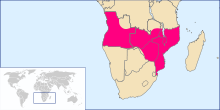
Back Ultimátum británicu de 1890 AST Ultimàtum britànic de 1890 Catalan Ultimátum británico de 1890 Spanish 1890eko ultimatum britainiarra Basque Ultimatum britannique de 1890 French Ultimato británico de 1890 Galician Ultimatum Britania 1890 ID Ultimatum britannico del 1890 Italian 1890년 영국 최후통첩 Korean Brits ultimatum van 1890 Dutch

The 1890 British Ultimatum was an ultimatum by the British government delivered on 11 January 1890 to the Kingdom of Portugal. Portugal had attempted to claim a large area of land between its colonies of Mozambique and Angola including most of present-day Zimbabwe and Zambia and a large part of Malawi, which had been included in Portugal's "Rose-coloured Map".[1] The ultimatum led to the withdrawal of Portuguese forces from areas which had been claimed by Portugal on the basis of Portuguese exploration in the area, but which Britain claimed on the basis of uti possidetis.
It has sometimes been claimed that the British government's objections arose because the Portuguese claims clashed with its aspirations to create a Cape to Cairo Railway, linking its colonies from the south of Africa to those in the north. This seems unlikely, as in 1890 Germany already controlled German East Africa, now Tanzania, and Sudan was independent under Muhammad Ahmad. Rather, the British government was pressed into taking action by Cecil Rhodes, whose British South Africa Company was founded in 1888 south of the Zambezi and the African Lakes Company and British missionaries to the north.[2]

- ^ Livermore, H.V. (1997). "Lord Salisbury's Ultimatum". British Historical Society of Portugal Annual Report. 24: 151.
- ^ M Newitt, (1995). A History of Mozambique, London, Hurst & Co, p. 341. ISBN 1-85065-172-8.